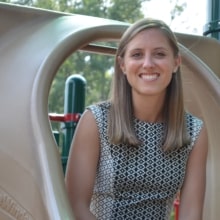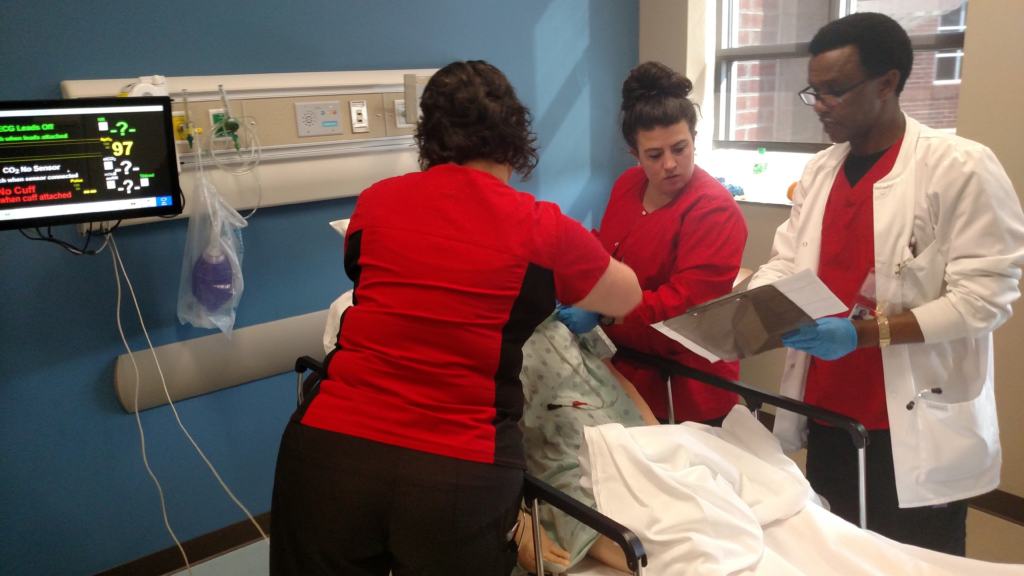
Over the last four months, our Reach NC Voices team traveled the state with the goal of visiting all 58 community colleges in North Carolina. We asked what role people think community colleges will play in the next 20 years and beyond. Responses highlighted the important role community colleges play in bridging the gap between the education system and the workforce.
As community colleges consider their future, they are searching for ways to increase student persistence and graduation. A new report by the Center for Community College Student Engagement profiles five community colleges’ advising programs, including Asheville-Buncombe Technical College. It suggests one area community colleges should focus to increase student engagement: advising.
Show Me the Way: The Power of Advising in Community Colleges demonstrates that community college students who receive more and higher quality advising are more engaged on a series of benchmarks, including active and collaborative learning, student effort, academic challenge, student-faculty interaction, and support for learners. The report uses data from surveys of more than 130,000 students and almost 10,000 faculty.
Community college advising at present
Advisors play different roles at different institutions, but the report details four main functions:
- Raising aspirations and setting goals: Advisors help students explore academic and career options and set goals.
- Developing academic plans and registering for courses: Advisors help students decide which courses to take for their goals.
- Helping students help themselves: Advisors connect students with support services, including academic, financial, and social services.
- Focusing on the big picture: Advisors analyze overall student outcomes and find ways to improve them.
According to survey data, 62 percent of entering students and 78 percent of returning students reported meeting with an advisor. Of the returning students, 68 percent stated academic advising/planning is very important, 24 percent stated it is somewhat important, and seven percent stated advising is not at all important.
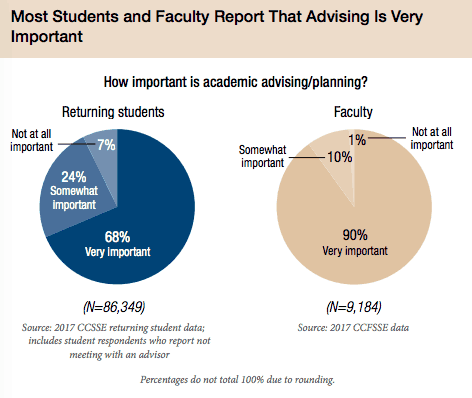
Findings: Structure, content, and intensity of advising matter
The Center for Community College Student Engagement found three factors matter in increasing engagement among students through advising: structure, content, and intensity.
Structure
The report suggests requiring advising for students, especially entering students, may increase their success. Some community colleges did this by not allowing students to register for classes until after they met with their advisors and received a PIN number from them. On the other hand, colleges that allow students to register a week before classes may not be able to provide advising services before students select their classes.
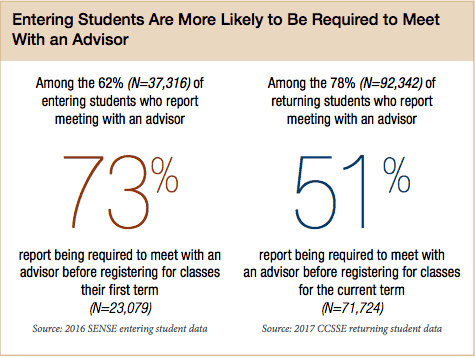
Additionally, who serves as advisors differs across institutions. Full-time faculty report spending more hours advising students than part-time faculty. Some colleges have advising requirements written into their faculty contracts while others have advising centers that employ full-time and part-time advisors.
Asheville-Buncombe Technical College, which is profiled in the report, has a special Transfer Advising Center for students enrolled in a transfer program. Students are assigned an advisor from this center at an initial transfer orientation session. Once they declare a pathway of study, the students receive a discipline-specific faculty advisor.
Community College of Philadelphia, also profiled in the report, employs nine full-time advisors who attend one of the required first-year courses. Since implementing this new advising model, the fall-to-fall persistence rate increased from 45 percent in 2015-16 to 51 percent in 2016-17.
Content
For the most part, advising sessions include advice about class registration and support services. Fewer students reported talking to advisors about outside commitments and employment opportunities or making an academic plan.
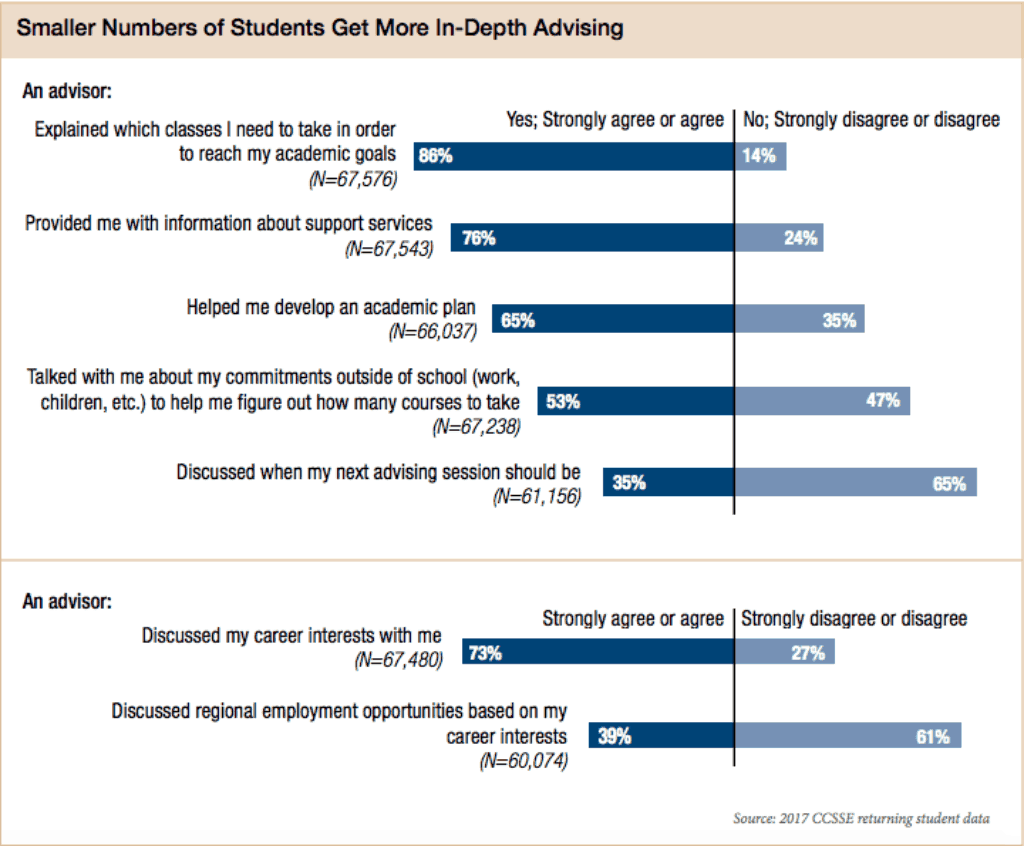
Students who reported receiving information about academic support services and help on developing an academic plan were more engaged. Additionally, students who reported transfer as a goal and used transfer advising services were more engaged.
Intensity
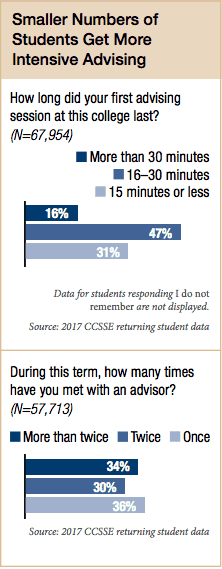
For 47 percent of returning students, the first advising session only lasted 16 to 30 minutes. Only 16 percent of returning students reported their first advising session lasted longer than 30 minutes.
The number of times students met with advisors is more evenly distributed. Thirty-four percent said they met with their advisor more than twice their first term, 30 percent said they met twice, and 36 percent said they only met once during their first term.
According to the survey data, both the duration of the initial advising session and the number of times students met with their advisors during their first term matter. Students who had longer initial sessions and met with their advisors more often were more engaged.
One model the report discusses is the student athlete advising experience, where student athletes are required to meet with an advisor and meet with their advisors more frequently. The report suggests evaluating the costs of scaling up this model.
Questions to consider
The report concludes with a list of questions community colleges should consider as they evaluate their advising practices.
- How does your college determine how many advisors it needs?
- Have expectations for advisors changed at your college in the past five years?
- Do advisors talk with students about their outside commitments?
- Does your college’s advising include early career exploration?
- How are advisors talking to students about transfer?
- Is advising consistent at your college?
- What is the faculty role in advising at your college?
- How are advisors integrated into the classroom?
- How are advisors monitoring student progress?
- Is your college tracking data on advising and assessing student outcomes based on the data?
- Are some students receiving more comprehensive advising services than others?
- What do your students and advisors say about advising?
For more discussion on this issue, Executive Director Evelyn Waiwaiole and staff are holding a webinar on the report on Tuesday, February 27 at 1:00 pm CT.
Weekly Insight Community Colleges Education
